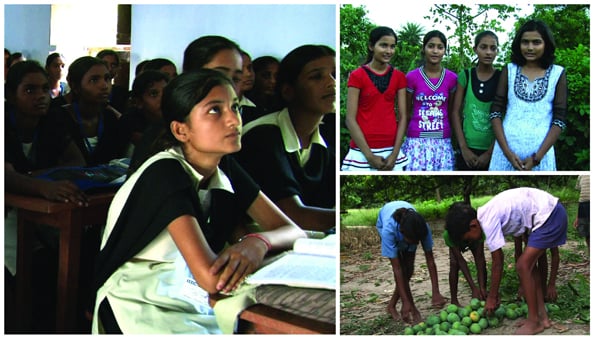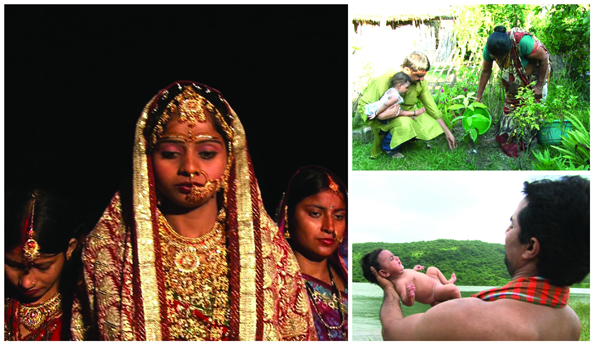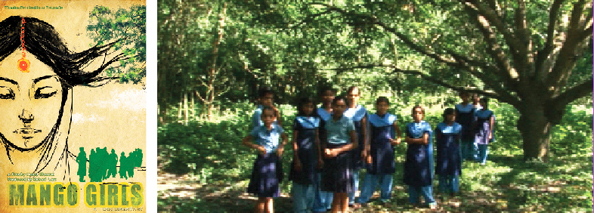In Dharhara village in the Bhagalpur District of Bihar, India, families plant a minimum of 10 trees whenever a female child is born. And, as Mango Girls, a new documentary by Kunal Sharma and Robert Carr, reveals, this small green village has become a role model for gender equality
Dedicated to bringing awareness to the age-old issue of female infanticide and foeticide in India, Kunal Sharma and Robert Carr are showing the world how a simple practice like planting trees, is both a symbolic move against female foeticide, as well as a practical one to generate income for families. What’s more, it is helping to keep the environment rich.
“The people of Dharhara village have shown the world how to solve this problem,” states a sanguine Kunal referring to the thousands of saplings already planted here.
It is a tradition which fellow filmmaker Manich Bhatt calls “practical, validating and liberating”, adding, “It suddenly gives the girl such power.”
The figures on the sickening subject of gendercide are staggering. Mango Girls opens with the chilling statement that female infanticide is as high as 500,000 a year as the camera zooms in on a seemingly loving father about to drown his cherubic baby girl who is gazing up at him, her face filled with trust.
A 2011 study in The Lancet medical journal found up to 12 million Indian girls had been aborted in the past three decades while activists fear eight million female foetuses have been aborted in India in the last decade alone. The UN reports approximately 200 million girls in the world today are ‘missing’. India and China are said to eliminate more female infants than the number of girls born in the US each year.
In China the barbaric practice is exacerbated by the one-child only policy, but in India the problem is more complex as it is primarily a cultural one. Children in South Asia are valued according to their earning potential with the patriarchal social model dictating that men are the sole breadwinners. Girls are seen as a drain on family resources during their childhood without bringing economic benefits later on. Added to this is the imposition of the archaic dowry system, which many insist is a crime.
Kunal is adamant that aborting the dowry system would see a drastic drop in gendercides. “The female child will be less of a burden if the dowry system is stopped,” he says simply. Consisting of large amounts of money and valuable goods, the dowry is an albatross around the neck of families with several daughters and the cause of much anxiety.
“There is female discrimination all over the world. Even in the Western world it is not uncommon. But the dowry system is one of the biggest threats to the female babies of India,” says Kunal.
Not so in Dharhara, where mango trees have become fixed deposits. In keeping with the village tradition, parents of female babies plant 10 trees shortly after childbirth. The trees, like the much-loved daughters, are nurtured over the years, with the fruit being sold to save money for the inevitable wedding. In this manner the villagers have overcome the fear of dowry spending and there is no dishonour attached to a daughter born in the family.
“We treat a girl child as the incarnation of goddess Lakshmi (the Hindu goddess of wealth),” says villager Munna Singh.
Kunal, who funded the film himself and with money borrowed from friends, feels a kinship with the families featured. “I grew up in Bhagalpur town in Bihar. The village of the film, Dharhara, can be reached from this town.”
For him, the journey has been worth every penny. “To see that the villagers are solving this inhumane issue with such simplicity is very much an eye opener.”
Kunal, a dynamic, multi-talented filmmaker who started his own media company Mandar Productions Pvt Ltd. in 2007, and Robert, a consultant and creative director for Visi Films who has resided in Mumbai since 2002, are already encouraging global discourse.
“We have received more interest from the press, in India and in Western countries than we thought possible; everyone we talk to is interested in this story. It is not only heart-warming, but shows a practical way of solving the problems caused by dowry systems as practiced in India. The cause is deep-rooted.”
But will abolishing the dowry system completely stop the entrenched moral codes and the subjugation of woman throughout India?
“With education and awareness things are improving slowly here,” says a philosophical Kunal about life in a male-dominated society. “In India’s cities things are slowly changing.”
Yet shockingly it is the cities and the wealthier areas of India where the figures soar, with South Delhi earning the dubious distinction of having the highest percentage of female infanticide. “The affluent people give more dowry and it has become a social stigma to have a girl. Having a son is a matter of pride. These people seem to have lost their logical senses and humanity,” says the filmmaker who grudgingly admits there is still a long and dispiritingly dark tunnel ahead. “Education has improved, but a lot more needs to be done. Education and equal opportunities to jobs and economic independence are the only way out.”
The ongoing violence and persecution suffered by women in South Asia was recently brought to the world’s attention with the gang rape and murder of two teenage cousins found hanging from a mango tree in northern India. The cruel twist of this atrocious story hit an already raw nerve with Kunal.“It is a heartbreaking tragedy and the law should be stringent on such criminals. It is tragic in itself – it does not really matter which tree they were hung on – but yes, it is symbolic how in one place the Mango trees are saving girls and here it became the grave for those two girls.”
While awareness of women’s issues is the primary aim of the documentary, its message extends well beyond that. With deforestation a significant factor in global warming, the villagers need to be applauded for their environmental endeavours too. They are not only saving lives and changing the way we think, they are also contributing to the survival of our planet.
“The humble practise of planting mango trees could – and should – become a national movement,” says social activist Kiran Bedi. One can only hope that Mango Girls will find the widespread viewership it deserves. If a small, unassuming village can embrace the noble cause of respecting both women and nature, then surely the rest of the world needs to sit up, take note and follow suit.
Kunal Sharma was one of the speakers at BOLDtalks Woman which was recently held in Dubai. Dedicated to driving solutions that advance females, BOLDtalks brought inspirational figures from across the world together to shed light on the incredible stories and plights of females across the world. Visit boldtalks.com for information on the next event.
Images supplied by Kunal Sharma
















